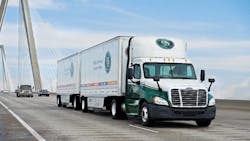NMFTA's Digital LTL Council developing API roadmap for data
The Digital LTL Council, a National Motor Freight Traffic Association (NMFTA) division, is developing a complete API roadmap to cover the full LTL shipment data stream—from quote to cash. When complete, the resulting downloadable APIs will enable shippers, carriers, and 3PLs to digitally perform every function within the LTL shipment data stream, the Council announced during its membership meeting.
An application program interface (API) provides a digital method allowing multiple computer programs to communicate. The Council claims that the standard API definitions being developed in this effort will smooth the way for players in the LTL industry to interact in various ways through their respective computer systems.
"It will greatly improve the efficiency of the industry," said Digital LTL Council's Executive Director Paul Dugent. "We've already identified adequacies with electronic bills of lading, almost eliminating the manual entry of information into the carriers' billing system and thereby eliminating keying errors and reducing the overall number of mistakes."
See also: End-of-July strike might permanently rob UPS of volume, analyst says
Dolly Wagner-Wilkins, chief technology officer at Worldwide Express, chaired the Digital LTL Council committee that produced the roadmap. She said the effort will reduce redundancy and work to make the entire LTL industry more effective.
"API standards are key because they allow everyone in the industry to build APIs one time and use the same API for all their partners, versus taking the time and spending money to build to each partner's specifications," Wagner-Wilkins said. "This enables faster digitization, which in turn greatly reduces errors and improves visibility of pickups, shipments, and charges between carriers and shippers."
The effort is an expansion of an initiative that is now nearing completion, through which the Council established industry-wide standards for electronic bills of lading (eBOL).
The new program will establish seven operational APIs and two administrative APIs.
The seven operational APIs will be:
1. Rate quotes
2. Electronic bills of lading
3. Pickup requests and pickup visibility
4. In-transit visibility
5. Preliminary rate charges
6. Financial rate disputes
7. Cargo loss and damage claims
The two administrative APIs will be:
1. Document retrieval
2. Carrier route guides
According to the Council, once implemented on an industry-wide basis, the initiative will eliminate time-wasting phone calls and other inefficiencies, including communication mishaps that arise from problems in shipping.
The Digital LTL Council's Chairman and Pitt Ohio's Chief Marketing Officer and EVP Geoff Muessig shared that LTL carriers do a good job advising shippers and 3PLs by digital communication when shipment milestones have been successfully passed. However, he said LTL carriers could improve using that same digital communication when a shipment exception arises.
"This includes a pickup that was missed, or a shipment misrouted, or additional charges such as a liftgate fee added to an invoice," Muessig said. "These new real-time APIs will allow carriers to communicate shipment and invoice exceptions as they happen, thereby reducing costs and improving service for all parties."
The process is in the early stages and NMFTA is gathering its members to seek their thoughts on how to prioritize the nine APIs and get the details right, according to an NMFTA release.
"As we move forward, we will prioritize the APIs outlined on our roadmap and publish more standards until we have digitized the entire LTL shipment and billing flow," Wagner-Wilkins said. "The faster we all adopt the APIs, the faster we will see benefits as an industry."
NMFTA's Executive Director Debbie Ruane Sparks said the API roadmap project is a natural next step for an organization that already developed the eBOL standard. Carriers already implementing the eBOL standard include Dayton Freight Lines, Estes Express Lines, Old Dominion Freight Line, Pitt Ohio, R+L Carriers, Roadrunner Transportation, Southeastern Freight Lines, and TFI International, which together represent 37% of revenue in trucking's LTL segment, according to the release. All are included on the FleetOwner 500: Top for-hire fleets list.
"NMFTA continues to lead the LTL industry in its drive to digitize," Sparks said. "These APIs will serve as a welcomed change to carriers who want to digitize but struggle with the time or the expertise to develop their own digital tools. Now they won't have to. They can download the ones we will offer, and that will mean the entire industry is harmonized and operating according to the same standard."
About the Author
FleetOwner Staff
Our Editorial Team
Kevin Jones, Editorial Director, Commercial Vehicle Group
Josh Fisher, Editor-in-Chief
Jade Brasher, Senior Editor
Jeremy Wolfe, Editor
Jenna Hume, Digital Editor
Eric Van Egeren, Art Director
